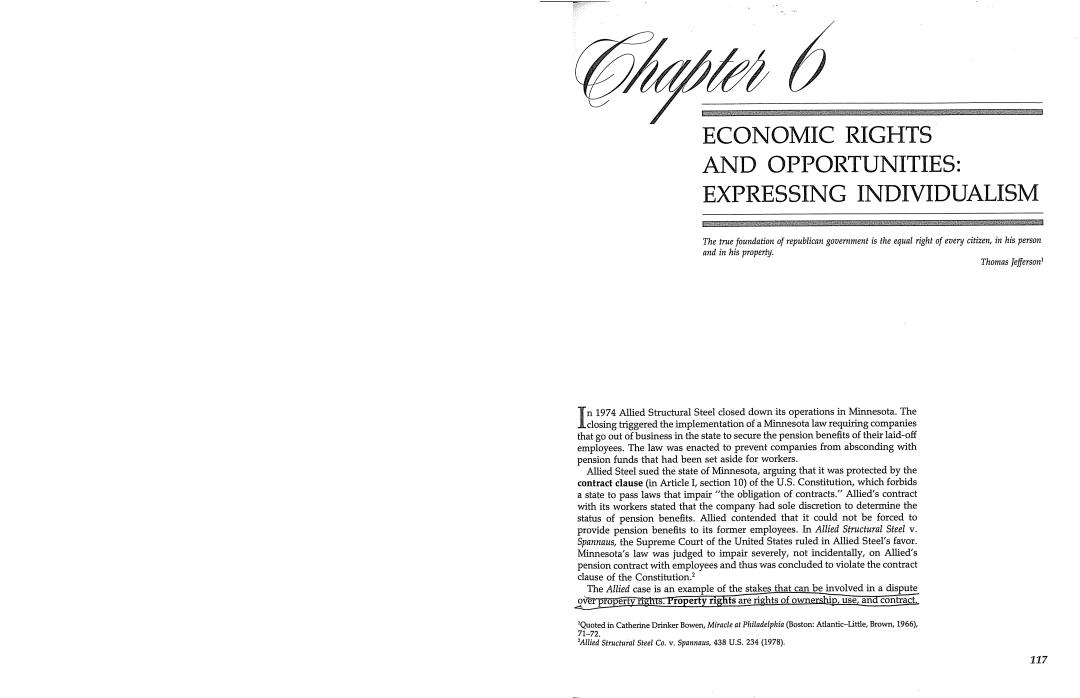
Chgnn b ECONOMIC RIGHTS AND OPPORTUNITIES: EXPRESSING INDIVIDUALISM The te foundation of republicnn govermment is the egual right of every citizen,in his person dnh格p7opey. Thomos leferson n 1974 Allied Structural Steel closed down its operations in Minnesota.The Lclosing triggered the implementation of a Minnesota law requiring companies that go out of business in the state to secure the pension benefits of their laid-off employees.The law was enacted to prevent companies from absconding with pension funds that had been set aside for workers. Allied Steel sued the state of Minnesota,arguing that it was protected by the contract clause (in Article I,section 10)of the U.S.Constitution,which forbids a state to pass laws that impair"the obligation of contracts."Allied's contract with its workers stated that the company had sole discretion to determine the status of pension benefits.Allied contended that it could not be forced to provide pension benefits to its former employees.In Allied Strctural Steel v. Spwuiaus,the Supreme Court of the United States ruled in Allied Steel's favor. Minnesota's law was judged to impair severely,not incidentally,on Allied's pension contract with employees and thus was concluded to violate the contract clause of the Constitution. The Allied case is an example of the stakes that can be involved in a dispute over property ights.Property rights are rights of ownership,use,and contract. Quoted in Catherine Drinker Bowen,Minacle at Philsdelpkis (Boston:Atlantic-Little,Brown,1966) 71-72. PAllied Struchurat Steet Co.v.Spannans,438 U.S.234 (1978) 117
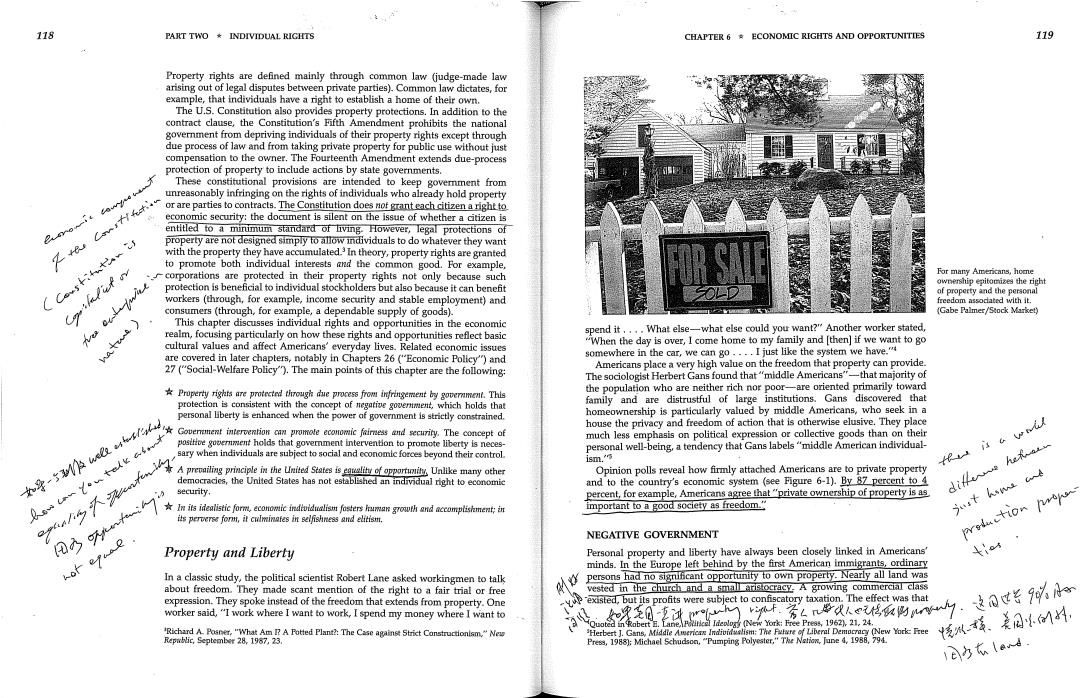
118 PART TWO INDIVIDUAL RIGHTS CHAPTER 6 ECONOMIC RIGHTS AND OPPORTUNITIES 119 Property rights are defined mainly through common law (judge-made law arising out of legal disputes between private parties).Common law dictates,for example,that individuals have a right to establish a home of their own. The U.S.Constitution also provides property protections.In addition to the contract clause,the Constitution's Fifth Amendment prohibits the national government from depriving individuals of their property rights except through due process of law and from taking private property for public use without just compensation to the owner.The Fourteenth Amendment extends due-process protection of property to include actions by state governments. These constitutional provisions are intended to keep government from unreasonably infringing on the rights of individuals who already hold property or are parties to contracts.The Constitution does nof grant each citizen a right to economic security:the document is silent on the issue of whether a citizen is entitled to a minimum standard of living.However,legal protections of property are not designed simply to allow individuals to do whatever they want with the property they have accumulatedIn theory,property rights are granted to promote both individual interests and the common good.For example, corporations are protected in their property rights not only because such Fot many Americans,homne protection is beneficial to individual stockholders but also because it can benefit of property and the workers (through,for example,income security and stable employment)and freedom assodated with it. consumers (through,for example,a dependable supply of goods). (Gabe Palmer/Stock Market) This chapter discusses individual rights and opportunities in the economic realm,focusing particularly on how these rights and opportunities reflect basic spend it....What else-what else could you want?"Another worker stated, "When the day is over,I come home to my family and [then]if we want to go cultural values and affect Americans'everyday lives.Related economic issues are covered in later chapters,notably in Chapters 26("Economic Policy")and somewhere in the car,we can go....I just like the system we have." 27("Social-Welfare Policy )The main points of this chapter are the following: Americans place a very high value on the freedom that property can provide. The sociologist Herbert Gans found that"middle Americans"-that majority of the population who are neither rich nor poor-are oriented primarily toward protection is consistent with the concept of negative govemment,which holds that family and are distrustful of large institutions.Gans discovered that personal liberty is enhanced when the power of government is strictly constrained. homeownership is particularly valued by middle Americans,who seek in a house the privacy and freedom of action that is otherwise elusive.They place 乎-sAue&yefd以 much less emphasis on political expression or collective goods than on their 置营量 rment holds that ent intervention to promote liberty is neces personal well-being,a tendency that Gans labels"middle American individual- m.% 宁之naeu色 A prevailing principle in the United States is equslit of opportuiny Unlike mamy other Opinion polls reveal how firmly attached Americans are to private property democracies,the United States has not established an individual right to economic and to the country's economic system (see Figure 6-1).By 87 percent to 4 di从ehe天a 恨是 security. percent,for example,Americans agree that "private ownership of property is as R办呀门 important to a good society as freedom." 4t人sa 车ec%onM,it culminafes in s2fss5Qd出tisn, proiuction pops NEGATIVE GOVERNMENT Property and Liberty Personal property and liberty have always been closely linked in Americans 4 minds.In the Europe left behind by the first American immigrants,ordinary In a classic study,the political scientist Robert Lane asked workingmen to talk persons had no significant opportunity to own property.Nearly all land was about freedom.They made scant mention of the right to a fair trial or free vested in the church and a small aristocracy.A growing commercial class expression.They spoke instead of the freedom that extends from property.One 欧风5dhF.法,以人元恺财4.2园便若9, profits were subject to confiscatory taxation.The effect was that worker said,"I work where I want to work,I spend my money where I want to Quoted in Robert E.Lane,Polesl Richard A Poser,"What Am A Potted Plant?The Caseagans Strict ConstruiNe SHerbert J.Gans,Middle Auericax Individuslism:The Fulare f Lberal De 悦州落.美园小M, Repicblic,September 28,1987,23. e乃衣{and
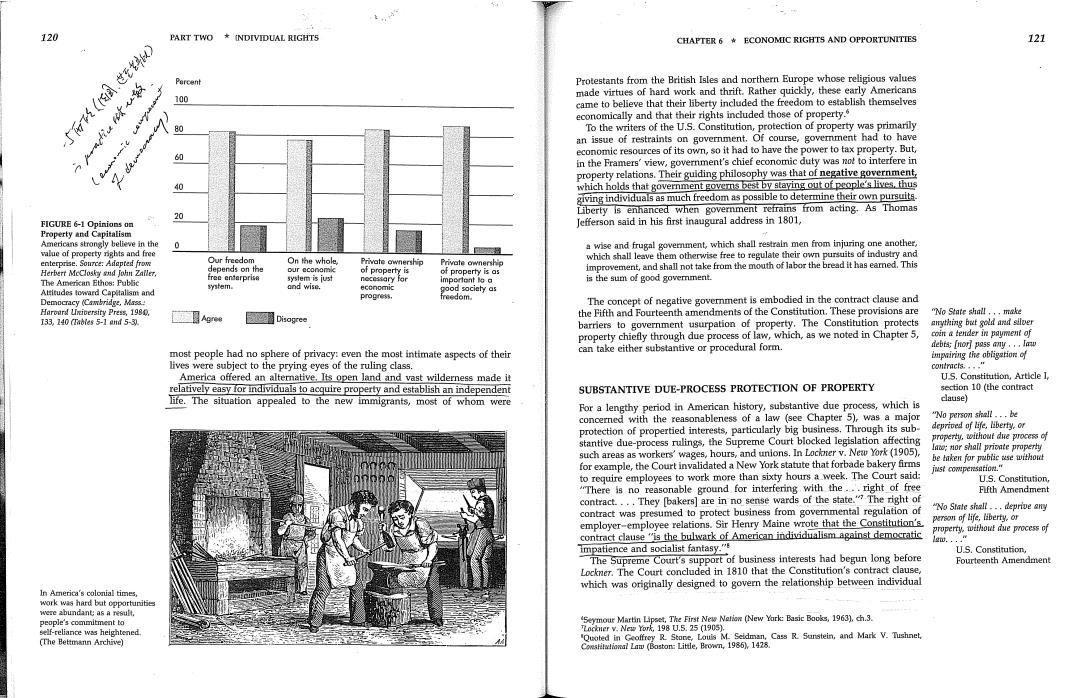
120 PART TWO (NDIVIDUAL RIGHTS CHAPTER 6 ECONOMIC RIGHTS AND OPPORTUNITIES 121 小而及(传国.世乏批) Protestants from the British Isles and northern Europe whose religious values u效 made virtues of hard work and thrift.Rather quickly,these early Americans 100 came to believe that their liberty included the freedom to establish themselves economically and that their rights included those of property. 80 To the writers of the U.S.Constitution,protection of property was primarily an issue of restraints on government.Of course,government had to have 6的 economie resources of its own,so it had to have the power to tax property.But, in the Framers'view,government's chief economic duty was not to interfere in property relations.Their guiding philosophy was that of negative government. 0 which holds that government governs best by staying out of people's lives,thus giving individuals as much freedom as possible to determine their own pursuits. 20 Liberty is enhanced when government refrains from acting.As Thomas FIGURE 6-1 Opinions on Jefferson said in his first inaugural address in 1801, Property and Capitalism Americans strongly believe in the 0 a wise and frugal government,which shall restraln men from injuring one another, value of property rights and free enterprise.Source:Adapted frow Our freedom On the whole Private ownership which shall leave them otherwise free to regulate their own pursuitsof industry and Private ownership of property is of property is as shall ot takefrom abr the.This The American Ethos:Public system is jus对 is the sum of good govemment. Attitudes toward Capitalism and good society as Democracy (Cswbridre,Msss The concept of negative government is embodied in the contract clause and 服Age Disagree the Fifth and Fourteenth amendments of the Constitution.These provisions are "No State shall. make I33,140es5-】a5-3. barriers to government usurpation of property.The Constitution protects aything but gold and silver property chiefly through due process of law,which,as we noted in Chapter 5, coin a tender in payment of most people had no sphere of privacy:even the most intimate aspects of their can take either substantive or procedural form. debts;[nor pass any...Iw mpiring the ablig婴iomc lives were subject to the prying eyes of the ruling class. contructs.,,” America offered an altemative.Its open land and vast wilderness made it U.S,Constitution,Article I, relatively easy for individuals to acquire property and establish an independent SUBSTANTIVE DUE-PROCESS PROTECTION OF PROPERTY section 10 (the contract life.The situation appealed to the new immigrants,most of whom were clause) For a lengthy period in American history,substantive due process,which is concerned with the reasonableness of a law (see Chapter 5),was a major 2N0s0刚sell..be protection of propertied interests,particularly big business.Through its sub- deprived o时fe,liberty.or stantive due-process rulings,the Supreme Court blocked legislation affecting property,pithout due proce寸 such areas as workers'wages,hours,and unions.In Locker v.New York(1905), be taken for pubiic wse without for example,the Court invalidated a New York statute that forbade bakery firms to require employees to work more than sixty hours a week.The Court said: U.S.Constitution, "There is no reasonable ground for interfering with the...right of free Fifth Amendment contract....They [bakers]are in no sense wards of the state."The right of contract was presumed to protect business from govermental regulation of "No State shalt...deprive any employer-employee relations.Sir Henry Maine wrote that the Constitution's P7sa时f,bery.o property,without due process of contract clause "is the bulwark of American individualism against democratic aw. impatience and socialist fantasy." U.S.Constitution, The Supreme Court's support of business interests had begun long before Fourteenth Amendment Lockner.The Court concluded in 1810 that the Constitution's contract clause, which was originally designed to govern the relationship between individual In America's colonial times, work was hard bat opportunities were abundant as a people's commitment to Seymour Martin Lipset,The First New Nalion (New Yark:Basic Books,1963).ch.3 self-reliance was heightened. TLocker v.Ne York,198 U.5.25 (1905) (The Bettmann Archive) Quoted in Geoffrey R Stone,Louis M.Seidm
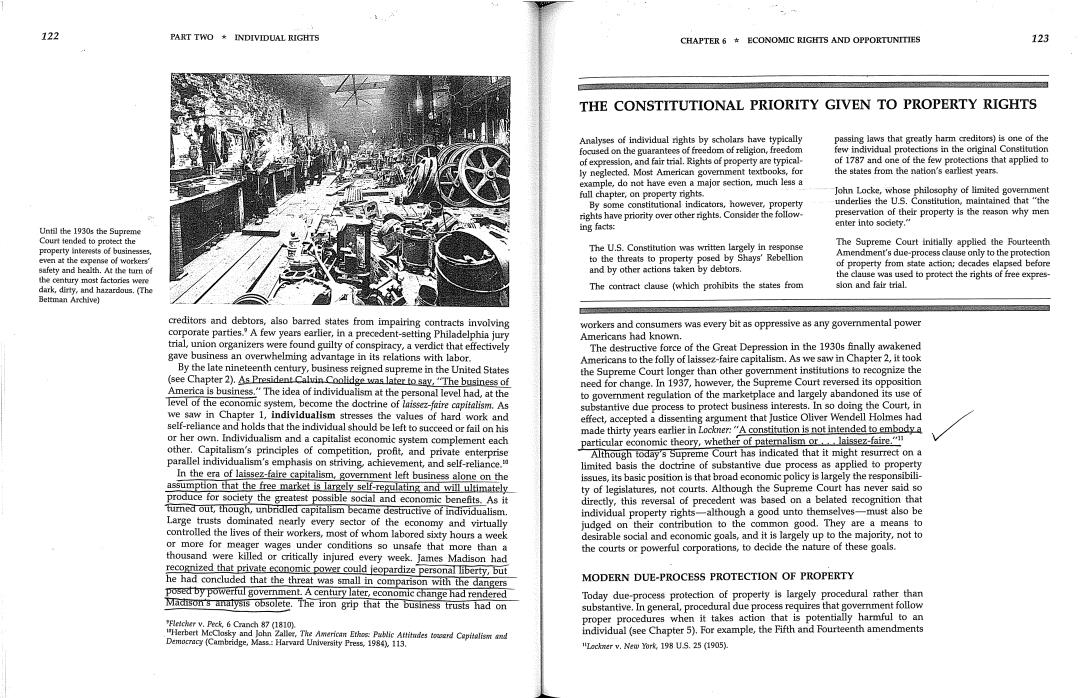
122 PART TWO INDIVIDUAL RIGHTS CHAPTER 6*ECONOMIC RIGHTS AND OPPORTUNITIES 123 THE CONSTITUTIONAL PRIORITY GIVEN TO PROPERTY RIGHTS Analyses of individual rights by scholars have typically passing laws that greatly harm creditors)is one of the focused on the guarantees of freedom of religion,freedom few individual protections in the original Constitution of expression,and fair trial.Rights of property are typical. of 1787 and one of the few protections that applied to ly neglected.Most American government textbooks,for the states from the nation's earliest years. example,do not have even a major section,much less a full chapter,on property rights. John Locke,whose philosophy of limited government By some constitutional indicators,however,property underlies the U.S.Constitution,maintained that "the rights have priorityover other rights.Consider the foilw preservation of their property is the reason why men Until the 1930s the Supreme ing facts: enter into society." Court tended to protect the The U.S.Constitution was written largely in response The Supreme Court initially appled the Fourteenth to the threats to property posed by Shays'Rebellion Amendment's due-process clause only to the protection even at the expense of workers safety and health.At the turn of and by other actions taken by debtors. of propertyfromseacion:decades elapsed before the clause was used to protect the rights of free expres- the century most factories were dark,dirty and hazardous.(The The contract clause (which prohibits the states from sion and fair trial. Bettman Archive) creditors and debtors,also barred states from impairing contracts involving workers and consumers was every bit as oppressive as any governmental power corporate parties.A few years earlier,in a precedent-setting Philadelphia jury Americans had known. trial,union organizers were found guilty of conspiracy,a verdict that effectively The destructive force of the Great Depression in the 1930s finally awakened gave business an overwhelming advantage in its relations with labor. Americans to the folly of laissez-faire capitalism.As we saw in Chapter 2,it took By the late nineteenth century,business reigned supreme in the United States (see Chapter 2).As President Calvin Coolidge was later tosay "The business of the Supreme Court longer than other government institutions to recognize the need for change.In 1937,however,the Supreme Court reversed its opposition America is business."The idea of individualism at the personal level had,at the to government regulation of the marketplace and largely abandoned its use of Tevel of the economic system,become the doctrine of issez-fire cmpitalism.As substantive due process to protect business interests.In so doing the Court,in we saw in Chapter 1,individualism stresses the values of hard work and effect,accepted a dissenting argument that Justice Oliver Wendell Holmes had self-rellance and holds that the individual should be left to succeed or fail on his made thirty years earlier in Lockner:"A constitution is not intended to embody a or her own.Individualism and a capitalist economic system complement each other.Capitalism's principles of competition,profit,and private enterprise particular economic theory,whether of patemalism orlaissez-faire." Although today's Supreme Court has indicated that it might resurrect on a parallel individualism's emphasis on striving achievement,and self-reliance. limited basis the doctrine of substantive due process as applied to property In the era of laissez-faire capitalism,government left business alone on the issues,its basic position is that broad economic policy is largely the responsibili- assumption that the free market is largely self-regulating and will ultimately ty of legislatures,not courts.Although the Supreme Court has never said so produce for society the greatest possible social and economic benefits.As it directly,this reversal of precedent was based on a belated recognition that furned out,though,unbridled capitalism became destructive of individualism individual property rights-although a good unto themselves-must also be Large trusts dominated nearly every sector of the economy and virtually judged on their contribution to the common good.They are a means to controlled the lives of their workers,most of whom labored sixty hours a week desirable social and economic goals,and it is largely up to the majority,not to or more for meager wages under conditions so unsafe that more than a the courts or powerful corporations,to decide the nature of these goals. thousand were killed or critically injured every week.James Madison had recognized that private economic power could jeopardize personal iberty,but he had concluded that the threat was small in comparison with the dangers MODERN DUE-PROCESS PROTECTION OF PROPERTY posedt by powerful government.A century later,economic change had rendered Today due-process protection of property is largely procedural rather than Madison's analysis obsolete.The iron grip that the business trusts had on substantive.In general,procedural due process requires that government follow "Flelcher v.Peck,6 Cranch 87 (1810) proper procedures when it takes action that is potentially harmful to an individual (see Chapter 5).For example,the Fifth and Fourteenth amendments Democracy (Cambridge,Mass:Harvard Unlveraity Press,1984)113. Lockmer v.New York,198 U.S.25 (1905)
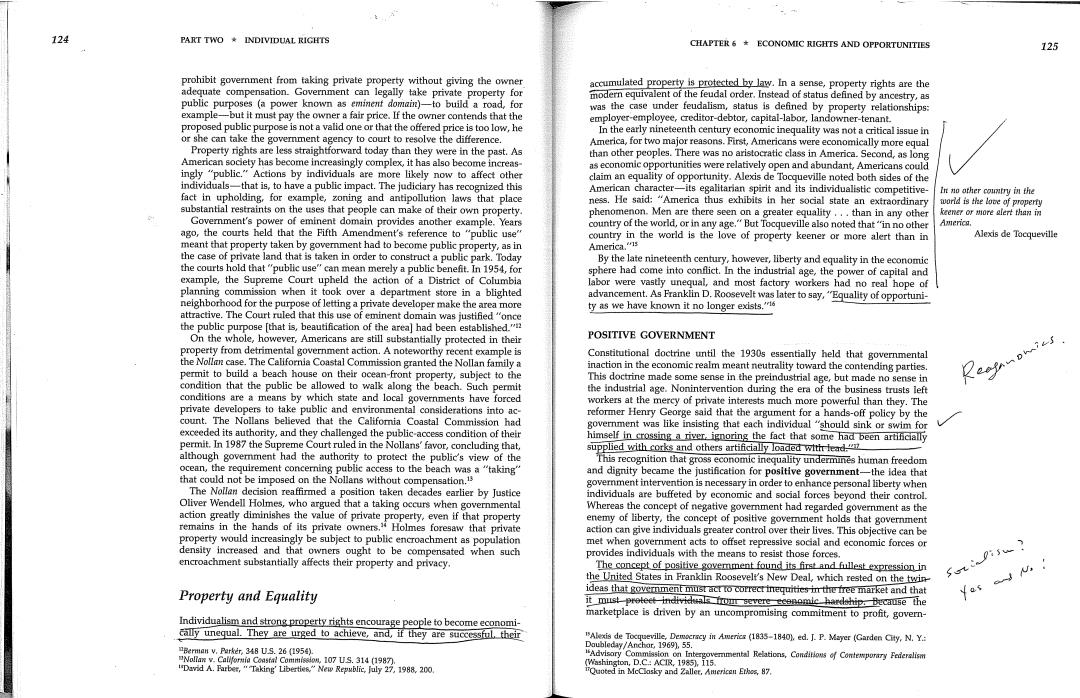
124 PART TWO INDIVIDUAL RIGHTS CHAPTER 6*ECONOMIC RIGHTS AND OPPORTUNITIES 125 prohibit government from taking private property without giving the owner accumulated property is protected by law.In a sense,property rights are the adequate compensation.Government can legally take private property for modern equivalent of the feudal order.Instead of status defined by ancestry,as public purposes (a power known as eminenf domain)-to build a road,for was the case under feudalism,status is defined by property relationships: example-but it must pay the owner a fair price.If the owner contends that the employer-employee,creditor-debtor,capital-labor,landowner-tenant proposed public purpose is not a valid one or that the offered price is too low,he In the early nineteenth century economic inequality was not a critical issue in or she can take the government agency to court to resolve the difference. America,for two major reasons.First,Americans were economically more equal Property rights are less straightforward today than they were in the past.As than other peoples.There was no aristocratic class in America.Second,as long American society has become increasingly complex,it has also become increas- as economic opportunities were relatively open and abundant,Americans could ingly "public."Actions by individuals are more likely now to affect other claim an equality of opportunity.Alexis de Tooqueville noted both sides of the individuals-that is,to have a public impact.The judiciary has recognized this American character-its egalitarian spirit and its individualistic competitive- fact in upholding,for example,zoning and antipollution laws that place ness.He said:"America thus exhibits in her social state an extraordinary world is the love of property substantial restraints on the uses that people can make of their own property phenomenon.Men are there seen on a greater equality...than in any other keener or more alert than in Government's power of eminent domain provides another example.Years country of the world,or in any age."But Tocqueville also noted that"in no other America. ago,the courts held that the Fifth Amendment's reference to "public use" country in the world is the love of property keener or more alert than in Alexis de Tocqueville meant that property taken by govemment had to become public property,as in America."s the case of private land that is taken in order to construct a public park.Today By the late nineteenth century,however,liberty and equality in the economic the courts hold that "public use"can mean merely a public benefit.In 1954,for sphere had come into conflict.In the industrial age,the power of capital and example,the Supreme Court upheld the action of a District of Columbia labor were vastly unequal,and most factory workers had no real hope of planning commission when it took over a department store in a blighted neighborhood for the purpose of letting a private developer make the area more advancement.As Franklin D.Roosevelt was later to say,"Equality of opportuni- ty as we have known it no longer exists."1 the puble pure hat b hmd be h On the whole,however,Americans are still substantially protected in their POSITIVE GOVERNMENT property from detrimental government action.A noteworthy recent example is Constitutional doctrine until the 1930s essentially held that governmental the Nollan case.The California Coastal Commission granted the Nollan family a inaction in the economic realm meant neutrality toward the contending parties. permit to build a beach house on their ocean-front property,subject to the This doctrine made some sense in the preindustrial age,but made no sense in condition that the public be allowed to walk along the beach.Such permit the industrial age.Nonintervention during the era of the business trusts left conditions are a means by which state and local governments have forced workers at the mercy of private interests much more powerful than they.The private developers to take public and environmental considerations into ac. reformer Henry George said that the argument for a hands-off policy by the count.The Nollans believed that the Califomia Coastal Commission had government was like insisting that each individual "should sink or swim for exceeded its authority,and they challenged the public-access condition of their permit.In 1987 the Supreme Court ruled in the Nollans'favor,concluding that, himself in crossing a river.ignoring the fact that some had been artificially supplied with corks and others artificially loaded with fead. although government had the authority to protect the public's view of the ocean,the requirement concerning public access to the beach was a"taking" This recognition that gross economic inequality undermines human freedom and dignity became the justification for positive government-the idea that that could not be imposed on the Nollans without compensation.1 government intervention is necessary in order to enhance personal liberty when The Nollen decision reaffirmed a position taken decades earlier by Justice individuals are buffeted by economic and social forces beyond their control. Oliver Wendell Holmes,who argued that a taking occurs when governmental Whereas the concept of negative govemment had regarded government as the m e ramde ormem rha e enemy of liberty,the concept of positive govemment holds that government action can give individuals greater control over their lives.This objective can be property would increasingly be subject to public encroachment as population met when government acts to offset repressive social and economic forces or density increased and that owners ought to be compensated when such provides individuals with the means to resist those forces. encroachment substantially affects their property and privacy. The concept of positive govemment found its first and fullest expression in the United States in Franklin Roosevelt's New Deal,which rested on the twin Property and Equality ideas that government must act to correct inequities in the free market and that it must proteet indivicals from severe ecenomic hardship.Because the marketplace is driven by an uncompromising commitment to profit,govern- Individualism and strong property rights encourage people to become economi- cally unequal.They are urged to achieve,and,if they are successful,their Berman v.Parker,348 US.26 (1954). NolTan v.Callforsfa Coastal Commissl 107Us.314198刀 "David A.Farbes,"Taking'Liberties"New Republic,july 27,1988,200 T